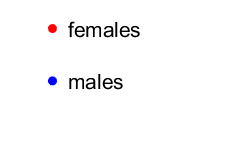Predictions & Data for this entry
| Model: std | climate: Am, Cwa, Cwb | migrate: Mp | phylum: |
| COMPLETE = 2.5 | ecozone: TPi | food: biPz, biCi | class: |
| MRE = 0.018 | habitat: 0iFe, 0iFl, 0iFr, 0iFc | gender: D | order: |
| SMSE = 0.001 | embryo: Fs, Fg, Fh | reprod: O | family: |
Zero-variate data
| Data | Observed | Predicted | (RE) | Unit | Description | Reference |
|---|---|---|---|---|---|---|
| am | 1460 | 1460 | (5.705e-05) | d | life span | IshiTach2012 |
| Lp | 2.65 | 2.684 | (0.01291) | cm | total length at puberty | guess |
| Li | 9.5 | 9.42 | (0.008415) | cm | ultimate total length | fishbase |
| Wwb | 0.00018 | 0.00018 | (0.0002736) | g | wet weight at birth | guess |
| Wwp | 0.24 | 0.239 | (0.004189) | g | wet weight at puberty | guess, fishbase |
| Wwi | 10.3 | 10.33 | (0.002917) | g | ultimate wet weight | fishbase |
| GSI | 0.12 | 0.1201 | (0.0006487) | g/g | gonado somatic index | ArauHaiv2000 |
Uni- and bivariate data
| Data | Figure | Independent variable | Dependent variable | (RE) | Reference |
|---|---|---|---|---|---|
| tL_fm |   | time since birth | total length | (0.03812) | IshiTach2012 |
Pseudo-data at Tref = 20°C
| Data | Generalised animal | Parambassis ranga | Unit | Description |
|---|---|---|---|---|
| v | 0.02 | 0.02062 | cm/d | energy conductance |
| p_M | 18 | 19.44 | J/d.cm^3 | vol-spec som maint |
| k_J | 0.002 | 0.002 | 1/d | maturity maint rate coefficient |
| k | 0.3 | 0.5378 | - | maintenance ratio |
| kap | 0.8 | 0.9461 | - | allocation fraction to soma |
| kap_G | 0.8 | 0.8003 | - | growth efficiency |
| kap_R | 0.95 | 0.95 | - | reproduction efficiency |
Discussion
- Males are supposed to differ from females by {p_Am} only
- mod_1: males have equal state variables at b, compared to females
Facts
- length-weight: Ww in g = 0.01318*(TL in cm)^2.96 (Ref: fishbase)
Bibliography